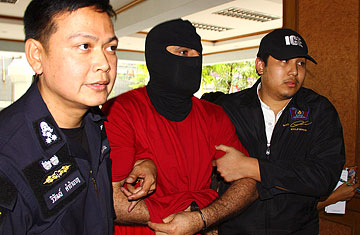
A Lebanese man with alleged ties to Hizballah is held at the Thai border-police headquarters in Bangkok on Jan. 16, 2012
Last Friday, just hours after the U.S. embassy in Bangkok warned on its website of a "possible terrorist threat" in tourist areas of the Thai capital, Thai security officials arrested a Lebanese man suspected of being a member of Hizballah, the Iranian-backed militant group. After three days of interrogations, police seized more than 8,800 lb. (4,000 kg) of bombmaking materials from the townhouse he rented in a Bangkok suburb. But instead of receiving praise for their police work, Thailand's government and security officials are being roundly criticized.
The scorn-filled and suspicious responses are the result of mistrust of the U.S. concern over lost tourism earnings, and the conflicting statements and shifting narrative of events by various government officials, all of whom are insisting tourists and locals have nothing to fear because they have the situation "under control." As an editorial in the English-language Nation newspaper opined, "In Thailand we have a long history of politicians telling us half-truths and lies, especially when it comes to security matters. And so when they tell us to be calm because everything is under control, we have good reason not to trust them." Ten nations aside from the U.S. have now issued terrorism alerts about Thailand to their citizens.
Thailand is no stranger to bombings and other forms of violence, but it has rarely been a target of international terrorism. Palestinian gunmen seized the Israeli embassy in 1972, and in 1992 an Iranian national and reputed member of Hizballah attempted to drive a truck bomb into the Israeli embassy only to be foiled when he got into a minor traffic accident. Thailand is, however, notorious as a smugglers' paradise — a transshipment point for guns, people, drugs and other contraband. It has also served as a haven for criminals, con men and occasionally terrorists: Hambali, the leader of Jemaah Islamiah, the Southeast Asia group allied with al-Qaeda, was apprehended in Thailand in 2003.
What is known for certain about the current episode is that Israeli intelligence notified Thai security officials about the presence of suspected Hizballah members in Thailand in late 2011. The government alerted the public to possible bomb threats in Bangkok on New Year's Eve, without naming who was behind them. Most people assumed the threat came from domestic political extremists or militant Muslims from Thailand's violence-plagued deep south.
On Jan. 13, the same day the U.S. embassy issued its warning, Thai police arrested Atris Hussein, a Lebanese citizen who also holds a Swedish passport, as he tried to depart Thailand at Bangkok's international airport. Police said another suspect remained at large, but it was not clear if that person was still in Thailand, and some unconfirmed local newspaper reports said he had been detained along with Hussein but had escaped. Thailand's national police chief, General Priewpan Damapong, told reporters that Hussein confessed that he and his alleged accomplices had intended to bomb locations in Bangkok popular with Israeli tourists, but that the attack had been "canceled" when they realized police were watching them. A few days later that story changed: Hussein confessing only that he bought massive amounts of urea fertilizer and ammonia nitrate, common bomb materials, to ship overseas, the police chief said.
Panitan Wattanayagorn, an expert in security affairs at Bangkok's Chulalongkorn University, said police may have a difficult time making any terrorism charge against Hussein, whom he described as a low-level operative at best, hold up in court, as he may change his confession again. And simply purchasing large amounts of fertilizer and chemicals is not illegal — or unusual — in an agricultural country like Thailand. Security officials may have hurt their ability to build the case by releasing so many details, he added. But he said it was unwise to assume that Thailand was not a target. "Traditionally, we are not a first-tier target of terrorists. But we are a soft target, and we may have weak defenses against those who intend to do harm. Furthermore, we've had a sharp increase in Israeli tourists during the past few years," he said.
Concern over lost tourism earnings — about 14 million foreigners visit Thailand each year, and tourism accounts for somewhere from 6% to 7% of gross domestic product — has prompted frustrated and angry outbursts, chiefly at the U.S. Foreign Minister Surapong Tovichakchaikul complained bitterly that foreign countries did not consult with him before issuing alerts. Suchart Bamrungsuk, a political scientist at Chulalongkorn University, warned that Thailand could be drawn into conflict with Hizballah. The U.S. embassy's Facebook page was also peppered with criticism: "Thank you. You made the stock exchange go down now!" wrote one person. "I wonder who are the foreign terrorists. The CIA?" posted another.
The English-language Bangkok Post, however, defended embassies issuing warnings in its editorial Tuesday, saying each had a right and responsibility to warn their citizens. "A successful terrorism attack harms tourism, as it did in Bali after the 2002 blasts. But travel alerts and warnings have had no discernible effect on the Thai tourist trade." But as government officials and others fret over the incident's impact on tourism, the question as to whether Thailand is now a target remains open.
